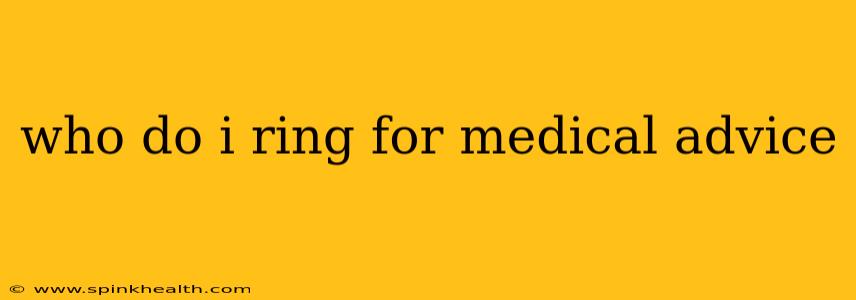Who Do I Ring for Medical Advice? A Guide to Navigating Healthcare
Finding the right person to call for medical advice can feel overwhelming, especially when you're unwell or worried about a loved one. This isn't a simple "one-size-fits-all" answer, as the best course of action depends on the urgency and nature of your situation. Let's break down the options and help you navigate this crucial decision.
Imagine this: It's late at night, and you're experiencing a sharp chest pain. Or perhaps your child has a high fever and won't stop crying. Knowing who to call in these situations can be the difference between timely treatment and a potentially serious delay.
1. For Life-Threatening Emergencies: Call 911 (or your local emergency number)
This is the most crucial point. If you're experiencing a medical emergency – such as severe chest pain, difficulty breathing, heavy bleeding, a sudden loss of consciousness, or a severe allergic reaction – dial 911 immediately. Don't hesitate. These situations require immediate, professional medical attention.
2. For Urgent but Non-Life-Threatening Concerns: Consider Your Options
This is where things get a bit more nuanced. Several options exist, and choosing the right one depends on several factors:
What are the symptoms? A persistent cough, a mild fever, or a minor rash might not necessitate immediate emergency care. However, if these symptoms are worsening or accompanied by other concerning signs, it's time to seek professional guidance.
What time is it? Your options might differ depending on the time of day. During regular business hours, your primary care physician's office is a good starting point. After hours, urgent care centers or telehealth services become increasingly relevant.
3. Your Primary Care Physician (PCP): Your First Line of Defense
Your PCP is your healthcare home base. They know your medical history and can offer personalized advice. Calling their office during regular hours is often the best approach for non-emergency concerns. They can assess your symptoms, provide guidance, schedule an appointment, or refer you to a specialist if needed.
4. Urgent Care Centers: For Faster Access to Care
Urgent care centers are a great option for situations that require immediate attention but aren't life-threatening. They typically have longer hours than PCP offices, including evenings and weekends, and offer quicker access to medical professionals. These centers handle a wide range of conditions, from minor injuries to common illnesses.
5. Telehealth Services: Convenient Remote Access
Telehealth platforms allow you to consult with doctors remotely via video call or phone. This is a convenient option for non-emergency situations, particularly during off-hours or if travel is difficult. Many telehealth providers offer immediate consultations, making them a valuable resource for quick advice and guidance.
6. Pharmacists: A Valuable Resource for Medication Advice
Don't underestimate the knowledge of your local pharmacist. They can offer advice on over-the-counter medications, potential drug interactions, and appropriate dosages. They are a valuable resource for managing everyday health concerns, especially relating to medications.
7. When to Seek Specialist Advice
If your symptoms persist or worsen, or if your PCP recommends it, you might need to consult a specialist. This could include a cardiologist, dermatologist, or any other specialist depending on your symptoms.
8. How Do I Choose the Right Service?
Consider the severity of your symptoms and the urgency of your needs. Don't hesitate to call your PCP's office for guidance if you're unsure where to turn. They can often help you determine the best course of action.
This information is for guidance only and doesn't replace professional medical advice. Always consult with a healthcare provider for any health concerns.

